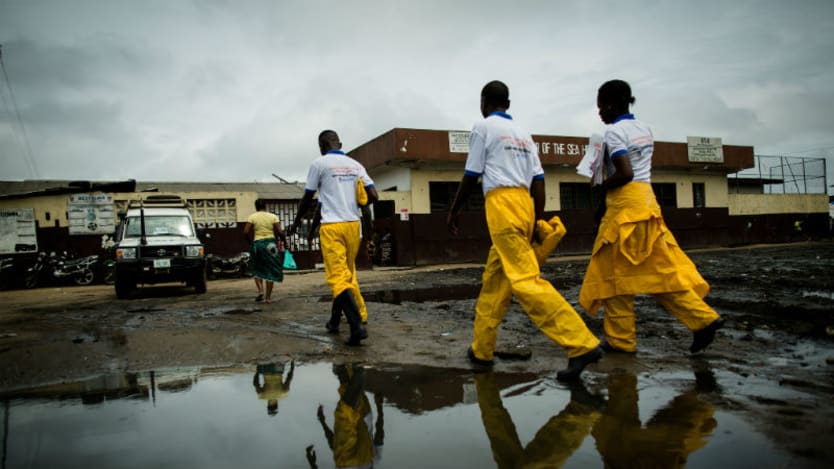
Four years ago, a devastating Ebola outbreak in West Africa killed more than 11,000 people and sparked worldwide fear of a global pandemic. Worldwide, leaders committed to prioritizing preparedness to ensure this would never happen again.
Last month, World Health Organization Director-General Tedros Adhanom Ghebreyesus called on the United Nations Security Council to do everything it can to fight the current Ebola outbreak in the volatile region of North Kivu, Democratic Republic of the Congo, noting “we are now at a critical point in the outbreak” that has killed 135 people to date.
Responding to this outbreak in a conflict-prone location has been extraordinarily challenging and dangerous. Cases have now appeared near the border with Uganda, raising concerns of a cross-border epidemic. Tedros asked for support in securing access to the affected areas and identifying financial resources to help the response, as WHO has received only 25 percent of the $33 million it has requested.
So what does this outbreak in DRC tell us about the world’s preparedness to deal with fast-spreading emerging infectious diseases?
Tedros: Ebola outbreak highlights weakness for panic-based response
As the Ebola outbreak in DRC threatens to spiral out of control, questions arise on just how much the international community has learned since the 2014 Ebola outbreak in West Africa.
On the positive side, an Ebola outbreak in DRC earlier this year was quickly contained by the deployment of an experimental Ebola vaccine hailed as a “game-changer” by health officials. The Nipah virus appeared for the first time in India, and was brought under control in a few months, after 16 deaths.
However, the world has not yet been tested with a major cross-border outbreak. One hundred years ago, the 1918 influenza outbreak killed more than 50 million people, in an era when global travel moved at a fraction of the current pace. Today, WHO warns of “Disease X,” recognizing that the next big outbreak may be a new disease we are not familiar with.
Whether a new disease or old, I believe we are still woefully unprepared for a global pandemic.
Following the West Africa outbreak, many changes were proposed to ensure that the world would be ready for the “next Ebola.” Last year, I co-authored a report that synthesized the recommendations from seven major post-crisis reports and commissions and wrote an analysis of progress against them. We found that many of the proposed reforms had not yet been implemented.
Unfortunately, one year later, progress is decidedly mixed. In a report published this summer in the British Medical Journal, we reviewed dozens of initiatives, organizations, and tools to increase global capacity to manage outbreaks. Important steps have been taken by WHO to improve capacity and response time, and we’ve seen plans put in place to develop vaccines for a select group of infectious diseases. Dozens of countries have evaluated their readiness to respond to an outbreak and developed plans to do so.
There are significant areas that still need attention, however. The country plans have not been financed and therefore cannot be implemented. Contrary to the urgency for vaccines, there is little energy around developing new drugs and diagnostic tools to help get outbreaks under control rapidly. And while some new funding has been made available, it is not nearly at the levels that are needed.
While WHO is now able to quickly respond to country-level outbreaks, it is not clear it is ready to, nor has the mandate to, lead the diverse set of players needed to address a fast-moving global outbreak. Significant coordination with multiple United Nations agencies, country governments, airlines, and other private sector companies will be needed to successfully stop the progress of a global epidemic.
As DRC struggles once again to prevent a lethal disease from spreading, there are specific steps the world must take to ensure we have the structures in place to prepare for a global pandemic.
Leadership: The U.N. secretary-general needs a mechanism in place to coordinate across all of these areas, from health to trade and travel. In the U.S., the Federal Emergency Management Agency has the mandate to prepare for, and respond to, disasters. We need a global entity that creates the infrastructure to be ready to stand up an emergency response when a major outbreak strikes.
Coordinated planning: This entity should create a global action plan that articulates all the areas that must be strengthened to ensure the world is prepared, and then regularly tracks progress made.
Funding: The G-7 has promised to provide funding to ensure countries have their preparedness plans in place, yet that funding has yet to be committed. WHO needs full resources for their daily operations, as well as for the newly established Contingency Fund for Emergencies. Donors should build on the initial commitment to develop vaccines for emerging infectious diseases, and also invest in research and development of medicines, diagnostics, and other medical countermeasures to an outbreak.
We have no idea what the next deadly emerging infectious disease will be, or where it will come from. But it is absolutely clear that the world cannot let the progress that has been made in fighting localized outbreaks lull us into thinking we are prepared for a global pandemic.
Search for articles
Most Read
- 1
- 2
- 3
- 4
- 5








